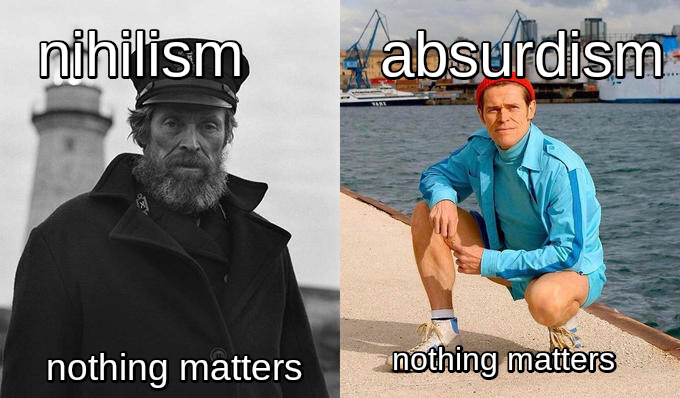this post was submitted on 31 Jul 2024
811 points (98.6% liked)
Memes
52845 readers
283 users here now
Rules:
- Be civil and nice.
- Try not to excessively repost, as a rule of thumb, wait at least 2 months to do it if you have to.
founded 6 years ago
MODERATORS
you are viewing a single comment's thread
view the rest of the comments
view the rest of the comments

That’s an interesting point.
Upon further reflection, I discovered I don't fully understand the nuances. So I tried to think it through.
I think it goes as follows:
So, on second thought, I think the meme does a great a job at capturing absurdism. Still, the difference between existentialism and absurdism is subtle.
What do you all think? Is that kinda the idea?
I wonder if Existentialists or Absurdists consider our biological reality and needs when developing the ideas. For instance, we need food, shelter, social acceptance, and so forth. What does this say about "meaning" and pursuits like fashion and style (as it relates to social acceptance?). How does Maslow's hierarchy of needs fit in with these philosophies?
The way I look at it, the big difference is between existentialism and absurdism lie in the problem of universalism. An existentialist is in many cases also going to be a Christian, possibly a Christian who is having a lot of doubt in their faith or struggling with the problem of evil, things like that. Existential philosophy tries to square the fact that we exist as moral beings but we seem to live in a world that lacks a universal concept of morality, so where does our morality even come from if it is not universal? To the existentialist, morality IS the underlying basic law of nature, and thus morality is itself a higher meaning, but morality is not applied universally, and this is a great conflict.
Absurdists, I feel, ultimately accept the fact that morality is NOT necessarily the basic underlying law of nature. Morality is subjective and it is personal, and it is messy and often falls short. I imagine that the absurdists have already gone through the existentialist crisis and come out on the other side with an acceptance of the seeming meaninglessness of it all, of the fact that our moral scruples are ultimately just a way to cope with existence and not some Higher Truth that we must strive towards.
So, in short:
That was definitely my experience of it. It helped me grow out of my existential angst learning about absurdists and how they just embrace the madness of it all.
Eh... it's not that we're trying to create meaning in the face of the absurd. The absurd is is the condition arising from the contrast between a human need for order and meaning on one side, and a lack of order and meaning (or lack of ability to grasp the order and meaning) on the other... and it's this absurdity that defines the human condition. And we should embrace it.
Honestly someone who spends their whole life searching for a universal morality could very well be embracing absurdism as well.
I also feel that the positivity surrounding absurdity comes from the fact that the absurd is the struggle (roughly between a desire and search for order and meaning) and the struggle is the human condition. And once you think about the struggle-not as something to overcome or win-but as the basic defining characteristic of humanity... you start to view the whole thing positively.
Well my comment has more upvotes on it than yours, therefore I can objectively posit that my explanation has greater meaning than yours, therefore I am right and you are wrong. This explanation has zero flaws in it whatsoever.
In all seriousness, I appreciate the comment and I generally feel that you encapsulated the idea more eloquently than I did.
Yeah but without your comment I wouldn't have posted mine!
It's not even really "must" - it's just what humans do instinctively. Recognizing that's what we're doing and being okay with it is the best way to go from there.
Kinda, but also the core of the absurdity is the contrast between the human need for meaning and order - and the inherent inability to find and create it ultimately. And as an added flavor, this absurdity is the main definition of the human condition. It's not exactly enjoying pseudo-meanings. It's enjoying the absurdity.
Recommend: the myth of sisyphus by camus. I believe you can find a full pdf of it online on some university website or another.